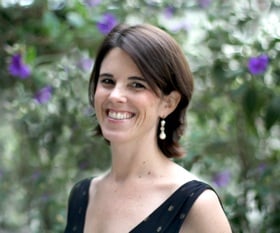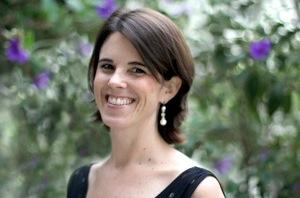
Nika Korniyenko
It turns out the 17th century was a great time for women composers. Magnificat Baroque and its guest soloist, soprano Jennifer Ellis Kampani, are hoping that their upcoming program, Donne Virtuose, will lead listeners to discover the wonderful work created by four of such extraordinary women.
It’s also a chance for local audiences to hear the voice of a Bay Area native who is making a name for herself as an interpreter of Baroque repertoire, as well as a specialist in the music of Spain and Latin America. Kampani now lives in Detroit, but she was born in San Francisco and grew up in Oakland, and she always loves coming back to her roots, especially with the chance to sing music she loves with a group she loves.
It’s not really quite as surprising as it might seem that women composers would have emerged during the 1600s. It was a time in Western music when women had more opportunities to express themselves artistically and professionally. It was also a period that saw the emergence of both solo song and opera, which is reflected in their work. But as it does today, it still took a combination of talent, determination, hard work, and the right opportunities to have your works heard and published, so these works represent some of the best music of that century.
Of the women featured in the program, Francesca Caccini is the real trailblazer. The daughter of Guilio Caccini, who wrote one of the first operas in Western music, she was a gifted performer who even did improvisation and was the highest-paid musician in the Medici court. Barbara Strozzi grew up in the intellectual circles of Venice and went on to publish music independently of either the church or the court, not an inconsiderable feat for that time. At one point, she had more published works than any male composer.
The third Italian composer in the group is Isabella Leonarda, who entered a convent in the small town of Novarra that was known for its music. She was a prolific composer with over 200 surviving works, encompassing all forms of sacred music, including nonliturgical pieces on sacred subjects that echo the style of the secular music of the day.
The fourth composer featured is Elisabeth Jacquet de la Guerre, a child prodigy on the harpsichord and later a part of the Parisian court of Louis XIV. Her dramatic and powerful music includes an opera written in the French style, instrumental pieces, and cantatas. The program is a natural offshoot of what Artistic Director Warren Stewart describes as Magnificat’s mission to perform music by women composers.
The group has an ongoing project to record the music of yet another 17th-century composer, Chiara Margarita Cozzolani, and it naturally led to the thought that if she was composing, in Stewart’s words, “Well, there must be others.”
That proved to be the case, and according to Kampani, “we picked the gems, with a lot of passion and drama and love.” She calls it a dramatic program with “amazing, stunning music that is very full-textured and not dainty.”
You’ll have a chance to hear this music, and more about these women, at the upcoming concerts Feb. 4–6. Come early for the preconcert lecture about the lives and music of these women. You’ll come away amazed at their talent and stories.

